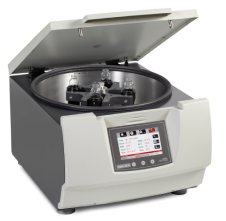Contact
On our page you will find a multitude of information that may be of your interest. If you have any questions, do not hesitate to contact our team:
Articles
and news

The MARPOL convention (short for “Marine Pollution”) is a set of international regulations adopted by the International Maritime Organization (IMO) to prevent marine pollution from ships. It comprises several annexes, each addressing a specific type of pollution.
Annex I of MARPOL focuses on oil pollution, setting out measures to ensure that any discharges from vessels comply with established limits. To this end, hydrocarbon samples are analyzed prior to discharge to determine their composition and verify regulatory compliance.
Before proceeding with the gas chromatography, the most common method for analyzing hydrocarbons, samples must be treated to remove suspended solids and allow hydrocarbon components to concentrate in a single phase. This step is achieved through centrifugation.
Typical centrifugation parameters range from 3,000 to 10,000 rpm, for 10 to 30 minutes, and at temperatures between 20 and 25ºC. The process separates the sample into two phases: a hydrocarbon-rich upper layer and a lower aqueous phase. Both are analyzed separately to confirm compliance.

In this context, the Digtor 22 C centrifuge is an optimal choice for laboratories working with samples governed by MARPOL Annex I. Its operational flexibility and precise control make it ideal for reliable sample preparation.
The accuracy of hydrocarbon analysis largely depends on the quality of sample preparation. Centrifugation improves pre-treatment for gas chromatography by eliminating impurities and producing a more concentrated hydrocarbon phase. This leads to more reliable results and supports informed decision-making.
If you wish to receive our latest news periodically, do not hesitate to subscribe to our Newsletter.
* Required fields. These fields must be completed to submit the form. Thank you
I have read and accept the privacy policy of the Company.
I agree to receive your commercial communications